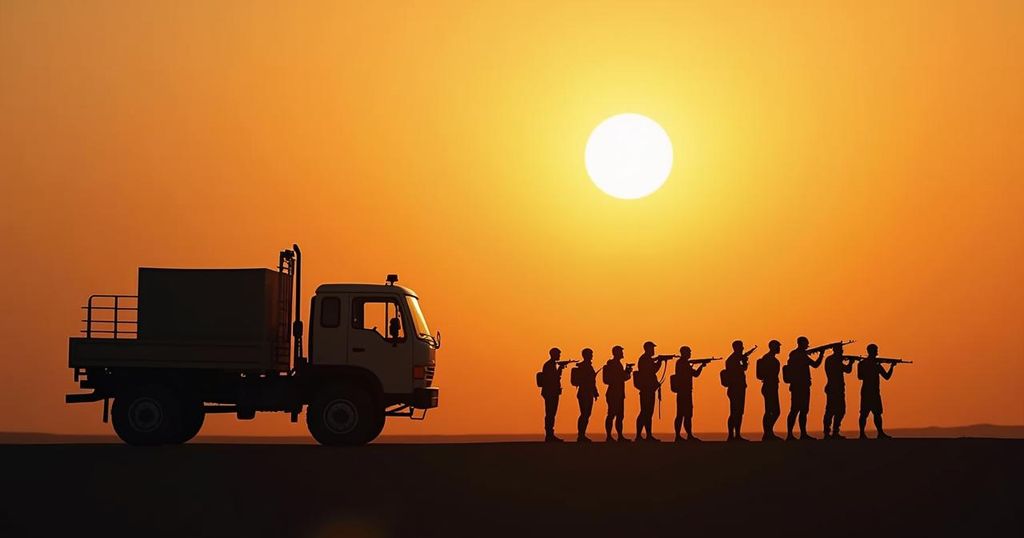Egypt has delivered a second shipment of military supplies to Somalia within a month, which includes anti-aircraft guns and artillery. This development could escalate tensions in the Horn of Africa, particularly involving Egypt, Ethiopia, and Somalia, as they navigate complex geopolitical disputes exacerbated by the Grand Ethiopian Renaissance Dam’s controversy. Concerns have also arisen about the potential for such military supplies to fall into the hands of extremist groups like al-Shabaab, further complicating the security landscape in the region.
On September 23, 2024, Egypt executed its second provisions of military supplies to Somalia within a month, an action that signifies a potential intensification of tensions within the Horn of Africa. This delivery, orchestrated through an Egyptian warship, encompassed crucial military assets including anti-aircraft artillery and guns. Such transactions may provoke direct confrontations involving Egypt, Ethiopia, Somalia, the separatist territory of Somaliland, and potentially additional regional players. Throughout this year, Egypt and Somalia have increasingly aligned themselves, both nations having sought to distance their stances from Ethiopia amid rising tensions over the Grand Ethiopian Renaissance Dam (GERD), situated on the Ethiopian bank of the Nile River bordering Sudan. Since the inception of the dam’s construction in 2011, Egypt has perceived it as a fundamental threat to its water security. Despite numerous negotiation attempts, including U.S.-facilitated discussions in 2019, the involved parties have been unable to formalize an enduring consensus. Compounding these issues, Ethiopia’s preliminary agreement with Somaliland, allowing land leasing for port development in exchange for potential recognition of Somaliland’s autonomy, has incited ire in Somalia, which maintains its claim over Somaliland. In response to the delivery of weapons, the Somaliland administration has voiced apprehensions regarding the possibility of these arms being acquired by extremist organizations such as al-Shabaab. Expert assessments regarding this escalation highlight the perilous nature of such military support. Bill Roggio, Senior Fellow and Editor of FDD’s Long War Journal, articulated that, “Egypt’s shipment of weapons to Somalia runs the risk of dangerous weapons systems, such as anti-aircraft guns and artillery, falling into the hands of al-Shabaab — al-Qaeda’s branch in East Africa”. He underscored the vulnerability of the Somali government, which struggles to maintain control against insurgent factions that have demonstrated the capacity to seize military strongholds. Furthermore, the presence of over 3,000 Ethiopian troops in Somalia—intended to counteract the al-Shabaab threat—could diminish as a result of ongoing disputes, thereby further undermining Somalia’s military capability. Mariam Wahba, a Research Analyst with the Foundation for Defense of Democracies, noted that, “Egypt’s delivery of a second weapons shipment to Somalia underscores Cairo’s frustration with Ethiopia over the Nile dam. By deepening its military ties to and presence in Somalia, Egypt is signaling its readiness to confront Ethiopia militarily. This situation only heightens the security risk in the Horn of Africa.” In light of these developments, the strategic coastal access of Somaliland becomes increasingly significant, particularly given the proliferation of Houthi attacks that have disrupted international shipping routes and adversely affected Egypt’s Suez Canal revenues. Ethiopia’s aspirations to establish a naval base within Somaliland’s coastal territory further compounds these complexities, as Somaliland officials assert that such a facility would bolster maritime security, particularly against the backdrop of increased assaults on commercial shipping orchestrated by Iranian-supported Houthi factions in Yemen.
The Horn of Africa, a region characterized by complex geopolitical dynamics, has witnessed rising tensions particularly surrounding the actions of Ethiopia regarding the Grand Ethiopian Renaissance Dam (GERD). Egypt’s primary concern is the dam’s potential impact on its Nile water supply, which is critical for its arid environment. As Egypt and Somalia have sought closer ties in response to perceived threats from Ethiopia, military engagements and weapons exchanges have emerged as focal points of this evolving geopolitical landscape. The significance of Somaliland’s autonomy and negotiations involving Ethiopia have further aggravated regional tensions, with the threat of al-Shabaab exacerbating national security concerns.
In conclusion, Egypt’s recent military shipments to Somalia represent a significant escalation in the volatile geopolitics of the Horn of Africa. With an evolving alliance between Egypt and Somalia, coupled with increasing dissatisfaction towards Ethiopia regarding the Nile dam issue, the potential for conflict grows. Both expert commentary and regional dynamics indicate that forthcoming actions may profoundly affect stability in the area, particularly as militant groups like al-Shabaab seek to exploit governmental vulnerabilities. Thus, the situation warrants careful observation as it unfolds.
Original Source: www.fdd.org






